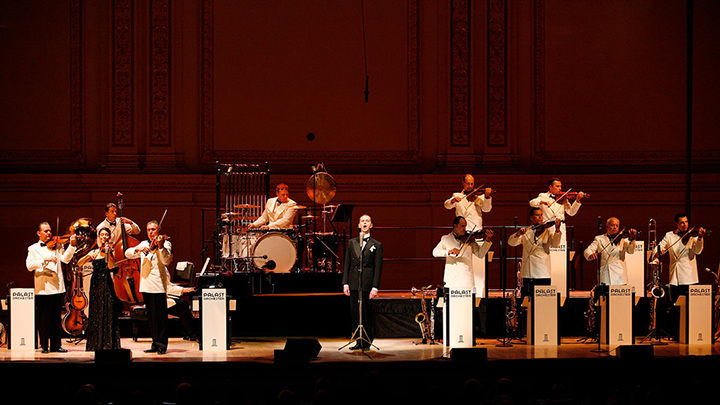
Weimar cabaret culture, together with the culture of our own stateside Roaring Twenties, or that of London’s Bright Young Things, never quite went out of fashion. These ur-party animals, from the hoity-toity to the hoi polloi, from aristocrats to bohemians, set the stage for a new era of frightfully gay times. As a child in the late 20th century, I knew that when I wanted to play dress up as a fancy nob around town, I should look for a feather boa, cigarette holder, and cloche chapeau. These items seemed part of the grammar of a fabulous nightlife, even though the original boa-wearers were dancing the Lindy Hop when my grandmother was a child.
This explosive cultural golden era, on the precipice of emergent fascism, still seems new and relevant 100 years on. I was, therefore, a little sad to see the cabaret songs of the Weimar presented by Max Raabe and Palast Orchester at Carnegie Hall last week mostly as historical music, as fixed in time as Vivaldi concerti. Max Raabe, as witty and elegant a band leader as you could ask for, came across at Carnegie Hall like a ghostly marionette. The stately orchestra looked like it would fit in with the New Year’s Eve party scene in The Shining. Palast played beautifully and were choreographed like an old-time jazz orchestra.
I don’t know if their wacky physical comedy hijinks are historically accurate, but they certainly livened up the evening. I had initially assumed that it was a mistake when the giant chimes fell down during the percussionist’s solo. A friend later assured me that it was deliberate, a skit the orchestra has been putting on for years. Certainly, when the percussionist gathered up the chimes with rakish panache it got the biggest laugh all night. It’s German slapstick comedy, folks! A vibe unto itself. Palast has been performing together for nearly 40 years and they certainly seem to enjoy their shenanigans. It was unfortunate that much of their subtle comedy was lost in the vastness of the hall.
Given the superb performance style and musicianship, it was a shame that the concert was mainly so culturally staid. When it comes to Weimar, Raabe and the band are all about the lieder. You can forget politics or satire, outside of a few technically perfect renditions of Kurt Weill songs. To be sure, I did not go to Carnegie Hall expecting a Sally Bowles routine, but neither did I anticipate whitewashed antiquity.
To be fair to Raabe and Palast, Carnegie Hall is a poor venue for cabaret music. Had I been drunk and dancing in an intimate setting, Raabe’s singing and comedic routine and the band’s excellent playing would have entertained me to no end. Raabe’s phrasing is extraordinary and his comic timing elegant and winsome. Ute Lemper he ain’t. In many ways he’s better (those rolled r’s are really something else). His ghost marionette routine is well executed. The problem was that too much of it was too much the same. However historically accurate the arrangements, outside of the tuxes and deco bandstand, Raabe and Palast mostly present the music cut off from its context. Weimar cabaret songs lack savor without a Weimar cabaret vibe. To remove this music from the sexual, political, and artistic liberation of its era seems like a deliberate refusal.
To say that Raabe and Palast Orchester give a G-rated take on the period is an understatement. Describing Berlin during the Weimar era, Austrian writer Stefan Zweig wrote that the city was transformed into the “Babel of the world…even the Rome of Suetonius had not known orgies like the Berlin transvestite balls, where hundreds of men in women’s clothes, and women in men’s clothes, danced under the benevolent eyes of the police.” My favorite Weimar figure is dancer Anita Berber, who danced in the nude with a monkey. She experimented with the impact of injected morphine on the female orgasm and would pee on her audience when they didn’t pay attention. Granted, no one needs any of that from Max Raabe and Palast Orchester. However, to not even glance in Anita Berber’s direction all night was to leave buried in the past so much of what makes the cabaret music of the Weimar period worth preserving.
Photo: Jennifer Taylor


























Comments